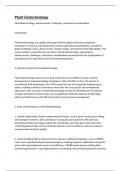Plant biotechnology
Plant Biotechnology: Advancements, Challenges, and Ethical Considerations
Introduction
Plant biotechnology is a rapidly advancing field that applies molecular and genetic
techniques to enhance crop productivity, improve agricultural sustainability, and address
global challenges such as food security, climate change, and environmental degradation. This
essay provides a comprehensive overview of plant biotechnology, exploring key
advancements, challenges, and ethical considerations associated with the manipulation of
plant genomes for agricultural and environmental purposes.
1. Historical Context of Plant Biotechnology
Plant biotechnology traces its roots back to the discovery of DNA's structure and the
development of molecular biology techniques in the mid-20th century. The advent of
recombinant DNA technology in the 1970s paved the way for the genetic engineering of
plants, enabling scientists to introduce novel traits into crop species and revolutionize
agriculture. Early successes in plant biotechnology include the development of herbicide-
resistant and insect-resistant crops, such as glyphosate-tolerant soybeans and Bt cotton,
which provided farmers with effective tools for weed and pest management.
2. Tools and Techniques of Plant Biotechnology
a. Genetic Engineering: Genetic engineering techniques, such as gene cloning, gene editing,
and transgene insertion, allow scientists to manipulate plant genomes with precision.
Recombinant DNA technology enables the introduction of foreign genes into plant cells,
conferring desired traits such as herbicide tolerance, insect resistance, disease resistance,
and improved nutritional quality.
b. Genome Editing: Recent advancements in genome editing technologies, such as CRISPR-
Cas9, have revolutionized plant biotechnology by enabling targeted modifications of specific
genes with unprecedented accuracy and efficiency. CRISPR-based genome editing offers
potential applications in crop improvement, trait stacking, and functional genomics research,
, allowing breeders to develop crops with enhanced resilience, productivity, and nutritional
value.
c. Omics Technologies: High-throughput omics technologies, including genomics,
transcriptomics, proteomics, and metabolomics, provide powerful tools for studying plant
biology at the molecular level. These technologies facilitate the identification of genes
associated with agronomic traits, the elucidation of gene regulatory networks, and the
characterization of metabolic pathways underlying plant growth, development, and stress
responses.
3. Applications of Plant Biotechnology
a. Crop Improvement: Plant biotechnology offers numerous opportunities for crop
improvement through the development of genetically modified (GM) and genome-edited
crops with enhanced traits such as yield, quality, nutritional value, and stress tolerance. GM
crops have been commercialized for various agronomic traits, including herbicide tolerance,
insect resistance, virus resistance, and drought tolerance, leading to increased productivity,
reduced chemical inputs, and improved farmer livelihoods.
b. Biofortification: Plant biotechnology can be used to biofortify crops with essential
micronutrients, vitamins, and antioxidants to address malnutrition and micronutrient
deficiencies in vulnerable populations. Biofortified crops, such as Golden Rice enriched with
vitamin A, offer sustainable solutions for improving public health and nutritional outcomes,
particularly in developing countries where dietary diversity is limited.
c. Environmental Remediation: Plant biotechnology has the potential to contribute to
environmental remediation efforts through the development of phytoremediation
technologies for soil and water purification. Phytoremediation utilizes plants' natural abilities
to absorb, metabolize, and sequester contaminants, such as heavy metals, organic
pollutants, and toxic chemicals, thereby mitigating pollution and restoring ecosystem health.
4. Challenges and Limitations of Plant Biotechnology
a. Regulatory Frameworks: The commercialization of GM and genome-edited crops is subject
to stringent regulatory oversight by government agencies, such as the US Food and Drug
Administration (FDA) and the European Food Safety Authority (EFSA), to ensure the safety of
human health and the environment. Regulatory approval processes for GM crops can be




